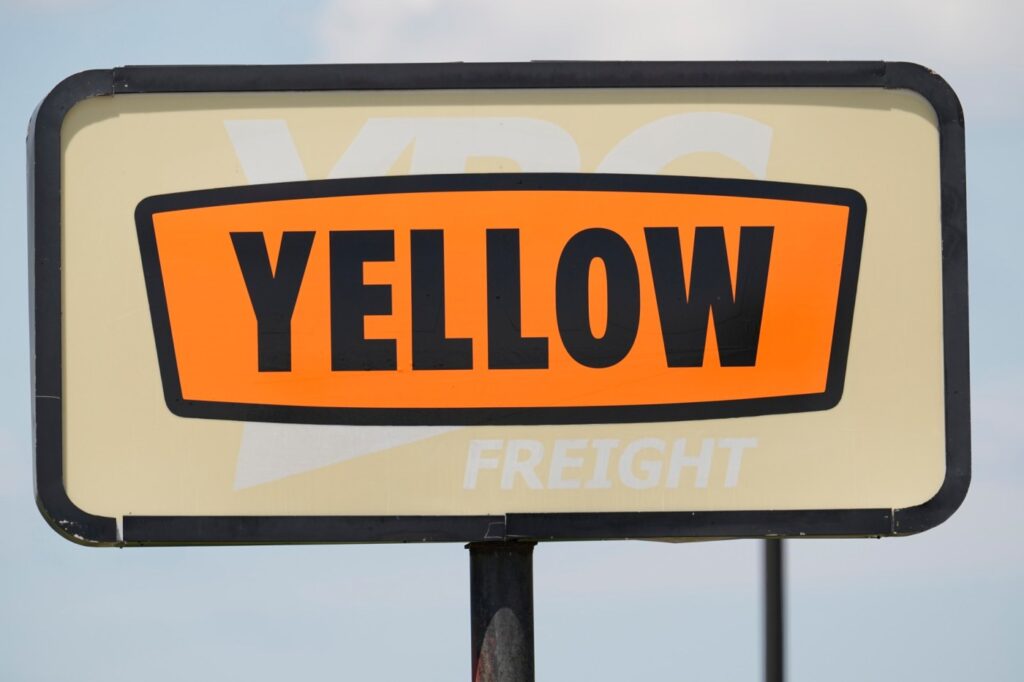
By Thomas Black | Bloomberg
One of the most prominent names in US short-haul trucking is poised to fade away, leaving billions of dollars in business up for grabs in a weakened freight market.
Yellow Corp., which hauls about 15% of major companies’ so-called less-than-truckload shipments, ceased operations and told union leaders that it plans to file for bankruptcy following years of financial struggles. As companies such as FedEx Corp. and Old Dominion Freight Line Inc. compete to absorb the freight, the reduction in excess capacity may allow carriers to raise prices, said Amit Mehrotra, an analyst with Deutsche Bank.
“This development is clearly very positive for the companies that remain open for business,” Mehrotra said Monday in a report.
The collapse of Yellow punctuates a sharp decline for the US freight market coming out of the pandemic, as shifting consumer habits have weighed on e-commerce shipments and caused industrial production to decline for a second month in June. Yet analysts and industry leaders say Yellow’s problems are due more to preexisting problems rather than industry dynamics.
The Nashville-based company, a conglomeration of short-haul trucking firms bought in recent decades, has struggled with considerable debt, including more than $1 billion maturing in 2024. In 2020, the US Department of Treasury agreed to provide a $700 million loan to bail out the company during the pandemic. Yellow has also clashed with its union, as the Teamsters threatened recently to strike over a missed employee benefits payment.
Yellow notified union officials of the bankruptcy plans after ceasing operations, according to a statement Monday from the International Brotherhood of Teamsters, jeopardizing a labor force of 30,000 employees that includes 22,000 union workers. Yellow didn’t respond to repeated requests for comment.
Yellow’s shares nearly doubled at 2:50 p.m. in a volatile trading session Monday in New York, giving it a market value of about $72 million. The company last year had revenue of $5.2 billion.
Yellow specializes in less-than-truckload service, which uses a warehouse network to combine several smaller shipments on one truck for short-haul deliveries. That makes it distinct from long-haul trucking and the parcel industry, which carries individual, usually smaller, packages.
“While this disruption has been anticipated for a while, we believe the boost to volume and pricing for other LTL companies is likely to provide support” to stock prices for companies such as Saia Inc., Thomas Wadewitz, an analyst with UBS, wrote in a note.
Lee Klaskow, a transportation and logistics analyst with Bloomberg Intelligence, cited Old Dominion and XPO Inc. as possible beneficiaries if they can pick up some of Yellow’s shipments.
The shutdown of Yellow operations would have been more disruptive for shippers if it had happened two years ago when there was little slack trucking capacity, said Melanie Burnham, chief financial officer of competitor Hercules, which has a fleet of 300 trucks and 30 facilities. Now, she said, “there are some strong companies out there that can service the needs of the shippers.”
Yellow operates about 300 cargo terminals and owns about half of those, said Morprop Advisors, a transportation real estate consultancy, in a note to clients on Monday. Yellow had already sold some terminals to competitors over the years and now half of its existing facilities are older and sitting on 10 acres of land or less, which makes them small.
“To their benefit, unlike two decades ago, there is now a much more robust investor market for truck terminals,” the note said. “Those buyers have been more elusive in 2023 than in 2022, but a bankruptcy auction of this magnitude will be hard for them to ignore.”
Related Articles
99-year old trucking company Yellow shuts down, putting 30,000 out of work
UPS Teamsters to rally in LA as strike deadline nears
Former Walnut warehouse workers settle suit over COVID safety complaints
Owners of empty Southern California offices pivoting to apartments, warehouses
